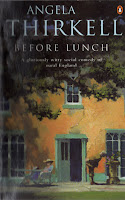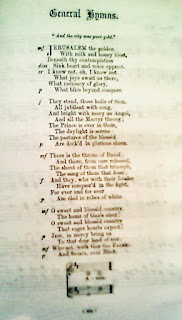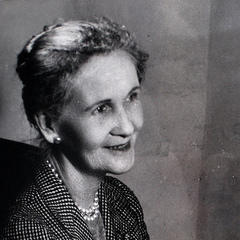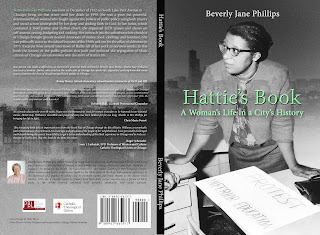Angela Thirkell as Hymnologist - Not That She Was Any Such Thing
Editor's note: Melody wrote this blog post in January 2021.
The British middle-brow fiction writer of the pre- through post-war periods in England was, of course, NOT a hymnologist. I became interested in Angela Thirkell’s writing on hymns and hymn singing as I’ve been researching for a scholarly article on her eschatology, and of course, she was not a theologian either! However, both topics of great interest to me are written about throughout the entirety of her Barsetshire novel series, nearly thirty novels, one per year. For those of you who are not aware of Angela Thirkell’s writing—she is taking a beating from many online commentators and some academic writers for her conservative views. I am certainly no conservative and many of the views she espouses are abhorrent to me. However, I feel if one only read novels whose writers one never found a disagreement with, that it would be almost unsustainable to maintain interest. For me, it is only her acerbic wit which makes it possible to read some of the cutting remarks and not want to throttle her for her views, which one must also remember were part and parcel of the thought (and actions) of her class at the time.
(I’m going to use the same convention I use in my Heaven Playlist for hymns—Hymnals will be in italics, hymn titles will be in quotation marks, and first lines will be in sentence capitalization.)We get our first sense of a general attitude towards hymn-singing in High Rising (London: Hamish Hamilton, 1933), the first of her Barsetshire novels. Laura Morland, Angela Thirkell’s alter ego, takes her precocious son Tony to church while visiting friends in the country. Tony has the same experience that many of us have when we see the hymn we are to sing, but realize it is to a hymn tune we do not know. “As the first hymn was given out, his face cleared. “We often have that in chapel,” he whispered to Laura. But when the harmonium played the opening bars, he remarked audibly, ‘Wrong tune,’ shut his hymn-book and looked about him in bored despair.” (119)

In a more extended meditation on the joys or woes of hymn-singing, in Before Lunch (New York: Carroll & Graf, 1988, c1940), we have several denizens of Barsetshire preparing (or not) for Sunday church-going and then the record of some of these while in church participating (or not) in the hymn-singing in the village church. First, pre-church-going, we hear the words of Mr. Cameron, who thinks he has a rather platonic love for Mrs. Middleton, his boss’s wife, discussing whether or not he will attend (Mr. Middleton never attends, preferring to commune with his stock rather than his church-going village neighbors). Mr. Cameron states,
‘No, Catherine, I am not going to church. I should like to come and sing out of the same hymn book as you, but my employer will probably want to talk with me this morning, or rather use me as a talking horse, if the expression may be allowed. And apart from the great pleasure of sharing a hymn book with you, I find the so-called music extremely trying. Why are all the hymns and psalms so high that one can’t get there? And if one sings, as I do, an octave lower, one’s voice makes no noise at all.’‘Perhaps it is all for the best,’ said Mrs. Middleton. ‘I always pretend that the print is too small for me to see the words and don’t sing at all and try to look as if I were meditating. I don’t suppose it really counts…’ (73)

Mr. Cameron [who changed his mind after he ascertained that Mr. Middleton did not want to talk to him that morning] had the pleasure of sharing a hymn book with Mrs. Middleton, but as it was one of those hymn books with double columns and Brilliant type, and both worshippers were long sighted, neither was able to join in the singing, though in any case they would not have done so. To Denis’s great satisfaction “Jerusalem the Golden” was the second hymn, and he exercised himself very happily in singing the various octaves as the tune soared or sank. Mr. Cameron greatly admired the way in which Daphne, who had a pleasant voice, and no diffidence, forged gallantly through everything, when everyone but the choir (four rebellious little boys and two farmers’ daughters) had failed.
‘I say,’ said Daphne accusingly to Mr. Cameron as they came out of church. ‘Why didn’t you sing?’
Mr. Cameron answered that no one could sing if they couldn’t see the words.
‘Well,” said Daphne, ‘why didn’t you put your spectacles on? People ought to sing. That’s what one goes to church for.’ (77-78)

‘Uncle David,’ said Edith, ‘are they nice hymns?’ and she pushed her hymn-book with its coloured markers into his hand.
‘You've got it upside down,’ said David, as ventriloquially as possible.
‘But are they nice hymns, Uncle David?’ said Edith, always a woman of one idea.
David realising (for he was not really stupid) that his youngest niece had a hymn-book more for the look of the thing than for any practical use it might be to her, turned the book the right way up, looked at the first marker and said, “Jerusalem the Golden.” A beatific smile overspread Edith's fat and charming face.
‘That's the hymn Nannie's cousin sang, Uncle David, when she was in the hospital,’ said Edith conversationally.
David was quite fond of Edith, in whom he recognised a capacity for selfish charm almost equal to his own, but Nannie's eye was already boring a hole through his left shoulder and he feared that any moment she might rise, take his hand and lead him out into the churchyard and even seat him on cold tombstones to repent, so he smiled anxiously, made a Hush face again and thrust the hymn-book back into his niece's hand. Edith, a true woman who adored the hand that held her in check, snuggled up to her Uncle David, who against his better judgment and in courageous or some may say foolhardy defiance of Nanny’s basilisk glance, put his arm round her and recomposed himself… (81-82)
“Jerusalem the Golden” is emphatically a Good Hymn. There is no need to argue the question. The united voice of church-going England says it is, the united intellect of that body knows that it is. David remembered how he used to cry whenever it was sung at Rushwater because of its exquisite nostalgic beauty, and how he felt free from all sin, and even made resolutions never to tease his sister Agnes again, for at least five minutes after its conclusion. He was touched, more than he would have liked to admit, to find that his niece Edith shared his feelings and was singing with a fervour hardly recognised outside the Salvation Army, her charming fat face irradiated by the light of another world.
It was at this moment that David practically made up his mind to buy some land, marry, and settle down to produce cheap wheat for the millions and a large healthy family who would increase and multiply like Job's, without the initial disadvantage of all having to be killed by the house falling on top of them so that their yet unborn brothers and sisters could take up the burden. In this heavenly frame of mind he remained (so swift is thought, so are a hundred years mirrored in the ink-pool each of us possesses) for at least twenty-five seconds, at the expiration of which eternity two things suddenly recalled him to earth.
The organist, followed and in some cases slightly preceded by his congregation (for Mr. Caxton held strong secret views as to the relative positions of Organist and Vicar during the hymns, and the nullity of the latter official), had pulled out a number of peculiarly saccharine and revolting stops and led his flocks into very high altitudes where only a true soprano, or those who had the good sense suddenly to sing an octave lower, could survive. The voices of praise had died, as they always do at that point, into batlike squeaks or bass rumbles, when to David’s amazement a bird’s soft effortless notes rose on wings from the pew in front. For a moment he thought the golden Sylvia also had a golden voice. Then he heard her grappling determinedly with the hymn in a muffled way and realised that the lark ascending was the little Fielding girl. It only lasted for a moment. The congregation returning from the unscaleable heights or the silent depths, joyfully crescendoed into “What radiancy of glory” and the bird vanished. David, too susceptible to beauty, though he often looked at it and left it, waited in almost unbearable suspense for the next verse. The small miracle was repeated, and, he felt, for his special benefit, for no one appeared to notice it.
Rapt by this unexpected treat, it was not till the fourth verse of the hymn was well on its way that he realised what anyone less susceptible to exquisite sound would have noticed long before, that his niece Edith, holding her hymn-book upside down and open at the wrong place, was deliberately singing gibberish. He looked nervously round to see if Nannie had heard, but that excellent woman, who was chapel and only went to church in her official capacity, was occupied in disapproving silently of the whole service, item by item. He breathed again. The hymn came to an end, the service proceeded. (83-84)
In her next book, Private Enterprise (London: Hamish Hamilton, 1947), the narrator mentions what seems to be a second fictional hymn with a new verse, said to be the favorite hymn of the Duke of Omnium, but no more than the first lines are given to us and as I say, it doesn’t seem to be a real hymn, though it would make a start for one! The first lines of this ‘new’ hymn are Each Morn We Humbly Bow the Face, Before the Coming of Thy Grace. (151)
Written in 1955, in Enter Sir Robert (Wakefield, RI: Moyer Bell, 2000, c1955), Thirkell begins to exhibit the characteristic bad temper that seethes in her later books. She struggled mightily to accept changes to society and, in fact, did not accept many of the changes that left her bewildered. However, I love her sentiment that each of us should think of the hymn that we think would have been most suitable. That suits me!
There was not a printed order of the ceremony [this was a ceremony to mark the death of Lady Emily Leslie]. Mr. Choyce had made a short service with some prayers, the latter part of the thirty-first psalm and a hymn. And will anyone who reads this think it is the hymn that she feels it would have been most suitable to sing; for not all are and there are a great many newish ones that are not only works of supererogation, but set the teeth on edge, not to speak of their great dullness… (46)
Nor were the hymn books in the little church up-to-date. Not for want of money, for both Mr. Halliday and Sir Robert Graham were generous and Sir Robert was very comfortably off, but simply because all those concerned liked the familiar hymns of their childhood. To those who have been reared on high-numbered hymns in what we can only call Art Hymn-Books, even to hymn six hundred and sixty-six, foretold in the apocalypse of St. John, the old book may appear dull and inadequate. To us it is memory, tradition, something even of tears, though not unhappy tears, as we look back to our childhood. (97)
In Never Too Late (Wakefield, RI: Moyer Bell, 2000, c1956), Thirkell invents, I believe, another hymn, this time as a joke.
‘And so nice to have proper hymns,’ said her ladyship. ‘Not those dreadful ones up in the high numbers for all sorts of things one has never heard about like Zenana Missions and Trades Unions.’
‘I do wish, Lady Graham, that you wouldn't make me laugh,’ said Mr. Choyce. ‘I absolutely agree with you, but unfortunately the Bishop doesn't. He has found a new hymn by a religious Atheist beginning:
‘O God, Although Thou Art Not There, Men Sing to Thee as If Thou Were,’
at which Captain James Graham and ex-Captain George Halliday burst into a loud and most un-funereal guffaw. (240)







Comments
Post a Comment